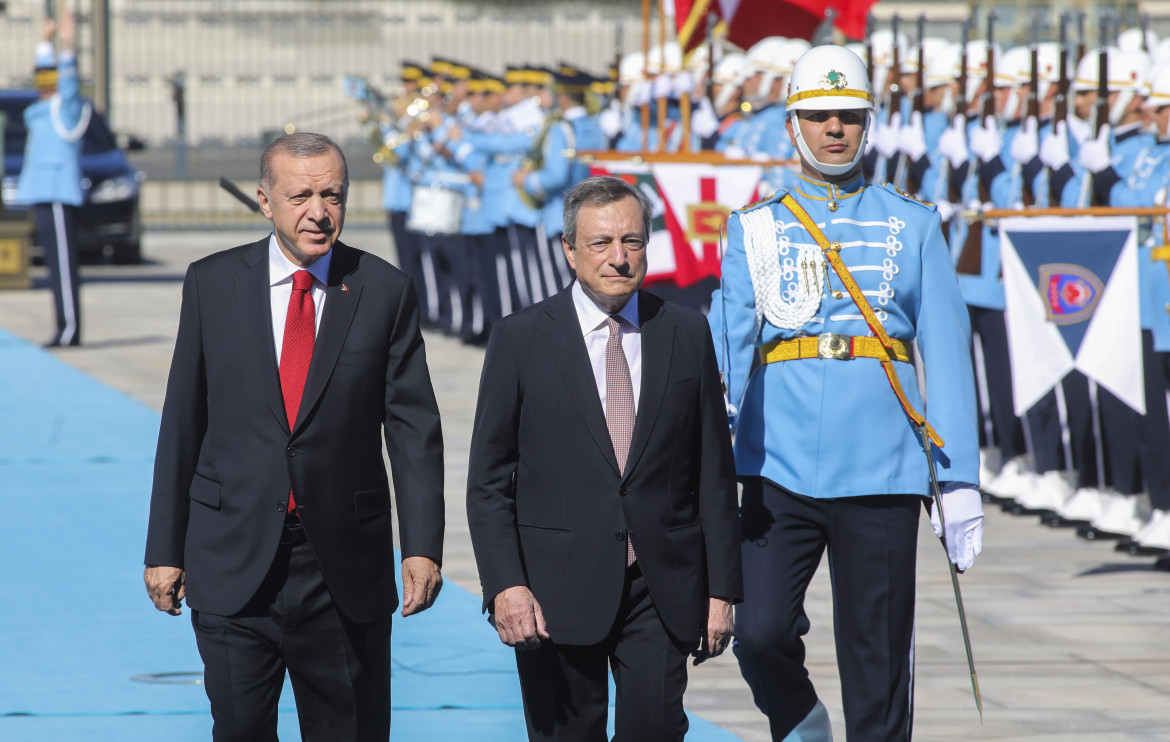Analysis
Draghi's bow to the Sultan, a ‘dictator’ turned friend
Once upon a time there was a dictator. Against the backdrop of these events and the war in Ukraine, Draghi was welcomed to the presidential palace in Ankara with pomp and circumstance.

Everything is solved with a bow before the Sultan. “With dictators, you have to be frank but cooperate,” Draghi said last year referring to Erdogan, leading to a diplomatic snafu. Since 2021, with the war in Ukraine, Libyan chaos and tensions in the eastern Mediterranean, the Italian Prime Minister has come a step closer: now we don’t just cooperate with the dictator, but we have become “friends” with him, as Draghi said on Tuesday in Ankara. And thus also accomplices.
Italy and NATO, in order to bring Sweden and Finland into the Alliance, have sold out the fate of the Kurds to Erdogan; and on Tuesday Draghi went to Ankara, in the company of five ministers, with hat in hand to ask for support on gas (TAP and TANAP), offshore concessions in Cyprus (obstructed by Turkey) and Libya, where Erdogan is the choreographer between the factions in Tripolitania and Italy with ENI is unable to extract the oil and gas it would need.
In return, we are offering Turkey arms – this is what the presence in Ankara of Defense Minister Guerini meant – an increase in mutual trade (currently at €20 billion), and we prepare to turn a blind eye to Erdogan’s misdeeds against the Kurds and internal opponents. Thus, it would be time to stop ranting about “Western values” as we supply Erdogan with Agusta helicopters to strike the Kurds in both Syria and Iraq. Draghi in Turkey gave proof of Western hypocrisy on democracy and human rights, and his visit, preceded by the Madrid agreement, strengthened the regime in its war against the Kurds: a few days ago, a Turkish drone killed the commander of the anti-ISIS Syrian Democratic Forces, Mizgin Kobane, in Raqqa. All this in the silence of the West, which just a few years ago hailed the Kurds as “our heroes” against the Caliphate and posted photos of Kurdish female fighters on social media.
Against the backdrop of these events and the war in Ukraine, Draghi was welcomed to the presidential palace in Ankara with pomp and circumstance for his meeting with Turkish President Erdogan. The Italian premier was preceded by a motorcade on horseback as the national anthems played. Together with the Turkish President, Draghi was paraded on a blue carpet, escorted by the presidential guard in high uniform to the entrance of the palace. Waiting for Draghi and Erdogan was a delegation in the uniforms of the armies of the 16 Turkish states founded before the Republic: in short, a grand occasion for a show displaying the Turkish leader’s neo-Ottoman ambitions.
This stage show, described by Draghi at the press conference as a “warm and splendid reception,” was certainly not accidental. It served as a way for Erdogan to reaffirm his role as the Sultan of NATO in front of an interlocutor with whom he had been experiencing acute diplomatic friction, which he has been able to smooth out over the past year thanks to the common interests of the two countries and, above all, to Italy’s submissiveness. Here is an example of how we have already yielded to Turkish demands: we recently asked permission from Ankara for ENI vessels to exercise the acquired right to drill in the Greek area of Cyprus, which of course infuriated the Greeks. And on Tuesday, Erdogan did not miss an opportunity to brand Greece as “a threat to Italy as well,” referring, among other things, to the disputes over migrants. That assertion was left without reply from the Italian side.
It will be the same when we will have to discuss the exclusive economic zone drawn between Turkey and Libya by Erdogan in 2019, which back then saved the Tripoli government from General Khalifa Haftar’s troops at the gates of the capital. Meanwhile, in Libya, the protests that erupted on the last “Friday of rage” dramatically spotlighted the risk of the country sinking into chaos and anarchy on the international stage, as the pro-Gaddhafi faction re-emerges.
And it is certainly no coincidence that Turkey is always in the middle, mediating between the factions in Tripoli, Misrata, Benghazi and Tobruk, where Italy has not touched the ball for some time now. We are so much at the mercy of the Turks in this part of the Mediterranean that they are envisioning the “Blue Homeland,” a strategic concept that they want to expand from the Aegean Sea, where the Turks are clashing with Greece, to North Africa and even further to the Gulf, where they have their military stationed in Qatar. Too high ambitions? Yes, perhaps, for a country also experiencing a severe economic crisis; but Erdogan is also playing a double game in the war in Ukraine, as a mediator with Putin and supporter of Zelensky’s government.
By comparison, Italy seems like a ghostly presence, including if we look at what has been signed in Ankara in concrete terms: agreements on small and medium-sized enterprises and mutual protection of industrial data. If there is anything strategic – arms, gas and maritime borders – it was left in the depths of the memoranda of understanding. We will probably have more information in the coming days, but one thing is certain: Draghi had no reproaches to make to the Sultan of NATO, and him calling Erdogan a “dictator” last year will remain as an irrelevant footnote.
Originally published at https://ilmanifesto.it/linchino-di-draghi-al-sultano on 2022-07-06
